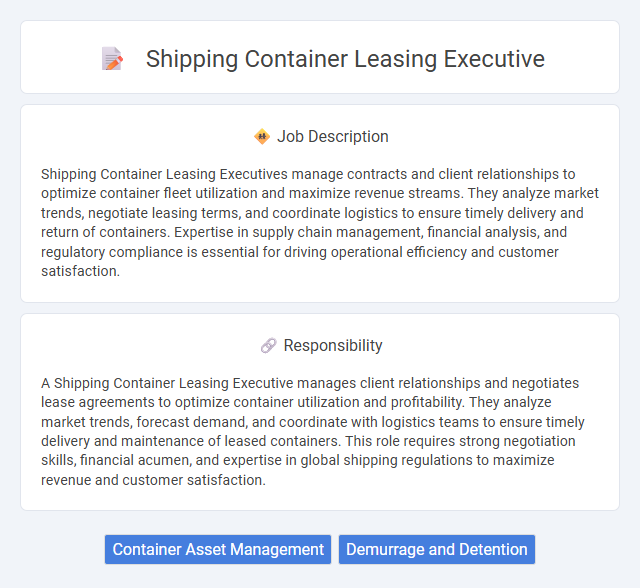
Shipping Container Leasing Executives manage contracts and client relationships to optimize container fleet utilization and maximize revenue streams. They analyze market trends, negotiate leasing terms, and coordinate logistics to ensure timely delivery and return of containers. Expertise in supply chain management, financial analysis, and regulatory compliance is essential for driving operational efficiency and customer satisfaction.
Individuals who are detail-oriented and possess strong negotiation skills are likely to be suitable for a Shipping Container Leasing Executive role. Candidates with high resilience to stress and the ability to manage multiple clients and contracts simultaneously probably perform well in this fast-paced, logistics-driven environment. Those lacking effective communication skills or a solid understanding of shipping and leasing regulations may find this position challenging.
Qualification
Shipping Container Leasing Executives require strong expertise in supply chain management, logistics, and container asset utilization, supported by a bachelor's degree in business administration, logistics, or a related field. Proven experience in contract negotiation, customer relationship management, and market analysis within the shipping or freight industry is essential for success. Excellent communication skills, analytical thinking, and proficiency in leasing software or ERP systems are critical qualifications to optimize container fleet deployment and maximize leasing revenue.
Responsibility
A Shipping Container Leasing Executive manages client relationships and negotiates lease agreements to optimize container utilization and profitability. They analyze market trends, forecast demand, and coordinate with logistics teams to ensure timely delivery and maintenance of leased containers. This role requires strong negotiation skills, financial acumen, and expertise in global shipping regulations to maximize revenue and customer satisfaction.
Benefit
Shipping Container Leasing Executives will likely benefit from gaining in-depth industry knowledge and securing competitive commissions based on lease volumes. They may experience flexible working conditions and opportunities for career advancement within global logistics companies. Networking within the shipping and freight sectors could also enhance their professional growth and marketability.
Challenge
Shipping Container Leasing Executives likely face the challenge of managing fluctuating market demand and complex logistics while ensuring optimal utilization of container assets. It is probable that navigating regulatory compliance across different regions adds another layer of difficulty, requiring sharp attention to detail. Balancing client expectations with cost efficiency may also present ongoing hurdles in this role.
Career Advancement
A Shipping Container Leasing Executive plays a pivotal role in managing leasing agreements and optimizing container utilization, driving revenue growth within the logistics sector. Expertise in negotiation, market analysis, and customer relationship management enhances prospects for advancement to senior management roles such as Leasing Manager or Operations Director. Continuous skill development in supply chain technology and contract law is critical for career progression in this dynamic, global industry.
Key Terms
Container Asset Management
Shipping Container Leasing Executives specialize in container asset management by optimizing the deployment, maintenance, and utilization of container fleets to maximize return on investment. They analyze market demand, negotiate lease terms, and oversee the life cycle of containers to ensure operational efficiency and asset longevity. Proficient in tracking asset performance and coordinating logistics, these executives help reduce downtime and control costs within the global shipping supply chain.
Demurrage and Detention
Shipping Container Leasing Executives specialize in managing container assets, focusing on minimizing demurrage and detention fees that impact operational costs and customer satisfaction. They develop strategies to optimize container turnaround times by coordinating with ports, shipping lines, and customers to prevent delays and reduce penalties associated with extended use beyond free time. Proficient in contract negotiations and tracking logistics, these executives ensure efficient container utilization and compliance with leasing agreements to maximize revenue and control demurrage-related expenses.
 kuljobs.com
kuljobs.com